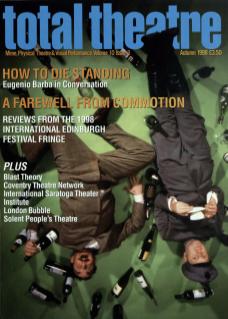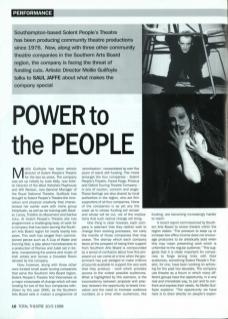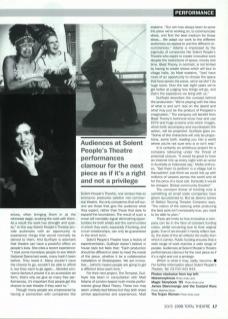Mollie Guilfoyle has been artistic director of Solent People's Theatre for the last six years. The company was set up initially by Jude Kelly, now Artistic Director of the West Yorkshire Playhouse and Will Weston, now General Manager of the Royal National Theatre. Guilfoyle has brought to Solent People's Theatre the innovation and physical creativity that characterised her earlier work with mime group Intriplicate, as well as her training with Gaulier, Lecoq, Théâtre du Mouvement and Sankai Juku. At Solent People's Theatre she has programmed a challenging body of work for a company that has been serving the Southern Arts Board region for nearly 22 years. This work has ranged from commissioned pieces such as A Cup of Water and Evening Star, a play about homelessness, to a production of Romeo and Juliet set in Ireland and incorporating the poems and music of Irish artists, and Across a Crowded Room, devised by the company.
Now, however, along with three other core-funded small-scale touring companies that serve the Southern Arts Board region, Solent People's Theatre find themselves at a major crossroads of change which will see funding for two of the four companies withdrawn by the year 2000, as the Southern Arts Board sets in motion a programme of ‘prioritisation', necessitated by over five years of standstill funding. The mood amongst the four companies – Solent People's Theatre, Forest Forge, Proteus and Oxford Touring Theatre Company – is one of caution, concern and anger. These feelings are also shared by local authorities in the region, who are firm supporters of all four companies. None of the companies is as yet any the wiser as to whose funding will remain and whose will be cut, nor of the implications that such radical change will bring.
One thing is clear, however; each company is adamant that they neither wish to change their working processes, nor carry the mantle of those companies that may cease. The dismay which each company faces at the prospect of losing their support from Southern Arts Board is compounded by a sense of confusion about how this proposed cut can come at a time when the government has just pledged to make millions of pounds available to support the very work that they produce – work which provides access to the widest possible audiences. What is highlighted by this scenario is the inconsistency between proposal and practice; between the opportunity to breed innovation and the need to increase audience numbers at a time when audiences, like funding, are becoming increasingly harder to reach.
A recent report commissioned by Southern Arts Board to review theatre within the region states: ‘The pressure to keep up or increase box office income does not encourage producers to be artistically bold when this may mean presenting work which is unfamiliar to the regular audience.’ This suggests that it is vitally important for companies to forge strong links with their audiences, something Solent People's Theatre, for one, have been working on achieving for the past two decades. The company use theatre as a forum in which many different groups have the opportunity, in a very real and immediate way, to join and to confront and express their needs. As Mollie Guilfoyle explains: ‘The opportunity we have here is to draw directly on people's experiences, often bringing them in at the rehearsal stage, evolving the work with them. As a result the work has strength and quality.’ In this way Solent People's Theatre provide audiences with an opportunity to experience things that would normally be denied to them. And Guilfoyle is adamant that theatre can have a powerful effect on people's lives. She cites a recent experience: ‘I took some homeless people to see Welsh National Opera last week, many hadn't been before. They loved it. Many wouldn't have the chance to go, wouldn't be able to afford it, but they want to go again... Besides economic factors it proved it is an accessible art form, that's why we give so many free performances, it's important that people get the chance to see theatre if they want to.’
Though many people are empowered by having a connection with companies like Solent People's Theatre, one senses that as economic pressures sideline non-commercial theatre, the only companies that will survive are those that give the audience what they expect, rather than those that dare to expand the boundaries. The result of such a move will inevitably signal diminishing opportunities for both artists and the communities in which they work, especially if funding, and in turn relationships, can only be guaranteed in the short term.
Solent People's Theatre have a history of experimentation. Guilfoyle doesn't believe in house style but feels that: ‘Each production should be different in order to meet the needs of the piece, whether it be a collaborative installation or Shakespeare. We are innovative... [which] means people are going to get a different show each time.’
Audiences at Solent People's Theatre performances clamour for the next piece as if it's a right and not a privilege
For their next project, The Tempest, Guilfoyle has been in consultation with Matt Adams of London-based multimedia performance group Blast Theory. These two may seem unlikely bed fellows but they both share similar approaches and experiences. Matt explains: ‘Our aim has always been to serve the piece we're working on, to communicate ideas, and find the best medium for those ideas... We adapt our work to the different audiences we appeal to and the different circumstances.’ Adams is impressed by the ingenuity of companies like Solent People's Theatre who aspire to create innovative work despite the restrictions of space, money and time. Blast Theory, in contrast, is not limited by having to create shows which will tour to village halls. As Matt explains, ‘[we] have more of an opportunity to choose the space that best serves the piece, since we don't do huge tours. Over the last eight years we've got better at judging how things will go, and that's the experience we bring with us.’
Guilfoyle describes the concept behind the production: ‘We're playing with the idea of what is and isn't real on the island and what may just be the product of Prospero's imagination.’ The company will benefit from Blast Theory's technical know-how and use CCTV and huge screens onto which images, which both accompany and counterpoint the action, will be projected. Guilfoyle goes on: ‘Some of the characters will only be projections, some both, leading you into a world where you're not sure who is or isn't real.’
It is certainly an ambitious project for a company labouring under the threat of potential closure. ‘It would be great to have an internet link up every night with an actor in Australia or Indonesia say,’ Mollie enthuses. ‘Get them to perform in a village hall in Hampshire! Just think – we could link up with millions of viewers across the world and all for the price of a local call. Ironically it would be cheaper. Global community theatre!’
The constant threat of funding cuts is something all small-scale companies have grown accustomed to. But as Jeremy James of Oxford Touring Theatre Company says, ‘The notion of the starving artist producing the best work isn't necessarily true, you need to be able to plan.’
There are limits to how innovative a company can be in the face of constant funding crises, whilst remaining true to their original goals. Even if art shouldn't merely reflect reality, the state of the art reflects the reality from which it comes. Public funding ensures that a wide range of work reaches a wide range of people. Audiences at Solent People's Theatre performances clamour for the next piece as if it's a right and not a privilege.


